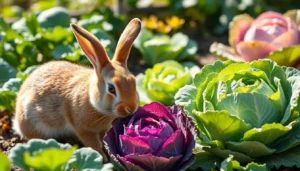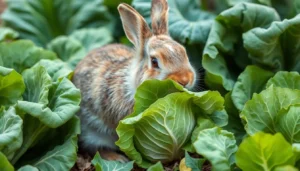Knowing what rabbits can eat is key for their health. This guide looks at whether cabbage is safe for rabbits. You’ll learn about their diet and how to feed them right for a long, happy life.
A fluffy white rabbit nibbling on a fresh green cabbage leaf against a bright yellow background. The cabbage leaf should be crisp and have droplets of water on it to indicate freshness. The rabbit’s fur should be soft and slightly ruffled, with its ears perked up in delight as it enjoys its meal. The background should be a solid, vibrant color to make the image pop.
Key Takeaways
- Rabbits need a lot of fiber for good digestion.
- Cabbage can be part of a rabbit’s diet, but don’t overdo it.
- It’s important to know about rabbit nutrition for their health.
- Some veggies are better for rabbits than others, and cabbage is one of them.
- Start with small amounts when trying new foods.
- Watch how your rabbit reacts to new foods in their diet.
Understanding Rabbit Nutrition
Rabbit nutrition is key to their health and happiness. A good, balanced diet keeps rabbits’ digestive systems and energy up. They need different foods for all the nutrients they need.

Essential Nutrients for Rabbits
A rabbit’s diet must have essential nutrients for rabbits for good health. These include:
- Fiber: Important for digestion, mainly from hay and leafy greens.
- Proteins: Needed for growth and energy, found in pellets and some veggies.
- Vitamins: Key for a strong immune system, found in greens and veggies.
- Minerals: In rabbit food pellets, help with bone health and other bodily functions.
The Importance of a Balanced Diet
A balanced diet for rabbits means eating a variety of foods. This includes hay, veggies, and pellets. Adding veggies like cabbage makes their meals more interesting and gives them important nutrients. Watching what they eat is key to keeping them healthy and growing right.
A group of rabbits nibbling on fresh cabbage heads in a lush green garden. The rabbits look healthy and energetic, showing the benefits of a balanced diet. One rabbit stands on its hind legs, eagerly reaching for a particularly large cabbage leaf. The sun shines brightly in the background, illuminating the scene with a warm glow.
| Nutrient | Source | Benefit |
| Fiber | Hay, leafy greens | Promotes healthy digestion |
| Proteins | Pellets, vegetables | Supports growth and energy |
| Vitamins | Greens, vegetables | Boosts immune function |
| Minerals | Commercial rabbit food | Strengthens bones and other functions |
Can Rabbits Eat Cabbage?
Many rabbit owners ask if cabbage is good for their pets. Cabbage can be a good choice if picked carefully. Some types offer important nutrients, but others might upset their stomachs. It’s important to know which ones are safe and the risks they bring.
Types of Cabbage Safe for Rabbits
Some cabbage types are better for rabbits than others. Here are the safe ones:
- Green Cabbage
- Napa Cabbage
- Red Cabbage
These are low in calories and high in fiber, perfect for rabbits. It’s good to mix things up. Switching cabbage with other leafy greens keeps their diet balanced.
Potential Risks of Feeding Cabbage
Feeding cabbage to rabbits has its risks. It has glucosinolates that can upset the stomach if eaten too much. This might lead to:
- Gas Bloating
- Digestive Upset
Watch how your rabbit reacts to cabbage. Start with a little bit to see if they like it. This way, you can make sure cabbage stays a good choice for them.
A fluffy white rabbit nibbling on a large, leafy cabbage while sitting in a field of green grass. The rabbit’s ears are perked up and its eyes are closed in contentment as it enjoys its fresh, healthy meal. The cabbage leaves are vibrant shades of green and have water droplets on them, indicating they were just picked from the garden. The background is blurred but hints of trees and blue sky can be seen in the distance.
Benefits of Including Cabbage in a Bunny’s Diet
Adding cabbage to a rabbit’s diet has many advantages. It’s safe and healthy in small amounts. It boosts your bunny’s health in many ways.
High Fiber Content
Cabbage is packed with fiber, which is key for rabbit nutrition cabbage. Fiber keeps the digestive system running smoothly. It cuts down the risk of a serious digestive issue in rabbits. So, cabbage is great for your bunny’s health and happiness.
Vitamin and Mineral Benefits
Cabbage gives rabbits more than just fiber. It’s full of vitamins and minerals that keep them lively. These include:
- Vitamin C: Boosts the immune system.
- Vitamin K: Crucial for blood clotting.
- Calcium: Makes bones and teeth strong.
- Potassium: Keeps the heart and muscles working right.
These vitamin and mineral benefits show why cabbage is good for rabbits. Adding it in small amounts helps your bunny stay healthy.
Safe Vegetables for Rabbits
It’s key to know the differences between various vegetables for your rabbit’s diet. Cabbage is good, but there are better options. This guide shows how cabbage compares to other veggies and what makes them safe.
Cabbage vs. Other Vegetables
Cabbage is a great choice, but there are others just as good. Here are some safe veggies for rabbits:
- Kale
- Carrots
- Bell Peppers
- Romaine Lettuce
- Broccoli
Each veggie has its own set of vitamins and minerals. For instance, cabbage is rich in fiber, but kale is packed with vitamin K. Knowing these differences helps you choose wisely between cabbage and other veggies.
What Makes a Vegetable Safe for Rabbits?
Choosing the right veggies for rabbits depends on a few things. Look for:
- Fiber Content: High fiber is key for good digestion.
- Water Content: High water veggies help with hydration.
- Low Sugar Levels: Low sugar foods prevent weight gain and health problems.
Following these tips helps pick safe veggies for rabbits. This leads to a balanced and healthy diet.
How to Introduce Cabbage to Your Bunny
Adding cabbage to your bunny’s diet can be rewarding. It’s important to start slowly and watch how they react. This helps you see if they like this leafy vegetable.
Starting with Small Portions
Begin by giving your rabbit just a little bit of cabbage. A small leaf or a few shreds is a good start. This lets their stomach get used to it without any problems. If they seem okay, you can give them a bit more each day.
Monitoring Your Rabbit’s Reaction
Watch your rabbit closely when you start giving them cabbage. Look for any signs of discomfort, like eating less, being tired, or having tummy troubles. If they act upset, they might not like cabbage. Keeping an eye out helps make sure it’s safe for them.
Feeding Cabbage to Rabbits: Best Practices
Feeding your rabbit a healthy diet is key, especially with cabbage. This veggie can be tasty but must be given thoughtfully. Knowing how often to feed it and preparing it right can boost your rabbit’s health.
Frequency of Feeding Cabbage
Cabbage shouldn’t be a daily food for rabbits. It’s better to give it as an occasional treat. Feeding it once or twice a week lets your rabbit enjoy it without upsetting its stomach. This way, you can keep your rabbit’s diet balanced.
Preparation Tips for Cabbage
Getting cabbage ready right is crucial for your rabbit’s health. Here are some key tips:
- Wash thoroughly: Rinse the cabbage well to remove any pesticides or dirt.
- Remove outer leaves: Discard wilted or damaged leaves to ensure freshness.
- Chop into small pieces: Cut the cabbage into manageable bites to facilitate easy eating.
These steps ensure your rabbit eats safely. Paying attention to the quality and how you present veggies helps make healthy choices.
| Feeding Schedule | Preparation Method | Serving Size |
| 1-2 times per week | Wash, chop, and remove wilted leaves | 1/2 to 1 cup (depending on rabbit size) |
Signs of Overfeeding Cabbage
It’s important to know the signs of overfeeding cabbage to keep your rabbit healthy. Eating too much cabbage can cause serious stomach problems. Watch how your rabbit reacts to spot any issues early.
Digestive Issues to Watch For
Feeding your rabbit too much cabbage can lead to digestive problems, such as:
- Bloating: Swelling in the belly means your rabbit might be uncomfortable.
- Gas: Too much gas can make your rabbit look bloated and act strangely.
- Diarrhea: Soft or watery stools mean it’s time to adjust their diet.
Spotting these signs early helps you take action for your rabbit’s health.
When to Stop Feeding Cabbage
If your rabbit shows any of these signs, stop giving them cabbage right away. Changing their diet can help fix their stomach. If issues don’t go away, see a vet to check for other problems.
Conclusion
This guide shows that cabbage can be a good addition to a rabbit’s diet, but only in small amounts. It’s important to watch how much your rabbit eats to keep them healthy. Cabbage gives rabbits important nutrients, but they should eat a variety of safe veggies and high-quality hay too.
A diet full of fiber and vitamins keeps rabbits happy and healthy for a long time. Adding cabbage to their diet along with other healthy foods makes sure they get what they need to stay well.
Feeding your rabbit right leads to better eating habits and a happy, lively pet. Always think about what they need to eat and talk to a vet if you’re unsure about their diet.
FAQ
Can rabbits eat cabbage?
Yes, rabbits can eat cabbage but only in small amounts. It’s important to watch how they react to it.
What types of cabbage are safe for rabbits?
Green and napa cabbage are safe for rabbits. But, it’s best to avoid red cabbage as it might upset their stomach.
What are the potential risks of feeding cabbage to rabbits?
Too much cabbage can cause gas and stomach discomfort. This is because of the glucosinolates in it. Always add new foods slowly.
Is cabbage beneficial for rabbit nutrition?
Cabbage is full of fiber, vitamins C and K, and potassium. These help support a rabbit’s immune system and health.
How often can I feed cabbage to my rabbit?
Cabbage should be an occasional treat, not a daily food. It’s best to give it only a few times a week for a balanced diet.
Are there other safe vegetables I can feed my rabbit?
Yes! Safe veggies for rabbits include kale, romaine lettuce, carrots, and bell peppers. Mixing up their diet is important for their health.
How should I introduce cabbage to my rabbit’s diet?
Begin with a small amount of cabbage and watch how your rabbit reacts. If they seem okay, you can give them a bit more.
What signs indicate my rabbit is overfed with cabbage?
Look out for signs like bloating, gas, diarrhea, or changes in behavior. If you see these, stop giving them cabbage and talk to a vet.
What makes a vegetable safe for rabbits?
A veggie is safe for rabbits if it’s high in fiber, low in sugar, and helps with hydration and digestion.


